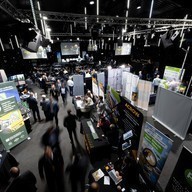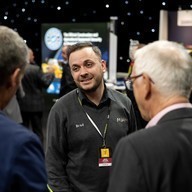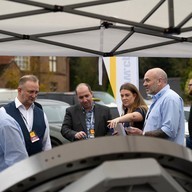Alan Guthrie reviews the CPA Conference 2024 which discussed why plant-hirers need to understand current industry challenges in order to address those in the future – and it also highlighted the human touch…
The CPA’s Conference 2024 could hardly have come at a better time. Held on 7th November at its established venue of The Heart of England Conference and Events Centre near Coventry, it took place the day after Donald Trump’s landslide victory in the US presidential election became clear, causing many to consider likely changes in the global economic landscape. And closer to home, Chancellor Rachel Reeves had delivered her Autumn Budget statement just a week previously, announcing several hotly debated measures including a rise in employers’ National Insurance contributions and changes to inheritance tax thresholds for family firms, making many plant hire companies ponder the future impact.
So the overall Conference theme of ‘Shaping the Future: Insights for the Plant-Hire Sector’ provided a comprehensive backdrop against which current challenges could be discussed together with future directions of travel.
The event comprised five panel discussions between plant-hire professionals, industry suppliers and relevant organisations, each focusing on a specific topic.
Debates were guided by two co-hosts throughout the day: Merryn Myatt, a former BBC news presenter who specialises in media management training and positive corporate communications as part of the Perris-Myatt consultancy; and Peter Haddock, the journalist, podcaster and vlogger whose Content with Media business covers construction and infrastructure development.

Merryn Myatt
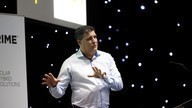
Peter Haddock
Delivering the opening Conference keynote speech, Steve Mulholland, CPA’s Chief Executive Officer, emphasised the need to combine evolution with revolution as the plant-hire industry adapts to challenges. With so many removing themselves from the available labour pool – especially younger people – companies had to find new ways to attract school leavers into the industry. This was compounded by an ageing workforce and retiring workers taking their skills with them, creating a sizeable knowledge gap. Furthermore, new recruits had to be guaranteed a safe, caring working environment offering good career opportunities.
Steve said that the drive to Net Zero was itself revolutionary, requiring an appropriate response. Not so long ago, he said, terms like AI (artificial intelligence), digitisation, sustainability and battery energy storage were unfamiliar; now they are part of everyday vocabulary and represent challenges that workers have to be trained for.
Implementing new technology and techniques also required care and understanding, he said. It was all very well having a target of having a certain proportion of, say, non-road mobile machinery (NRMM) on sites running on non-fossil energy sources by 2030, but specific plans for implementation and timetables to achieve it were needed for phasing in solutions – especially as new equipment is more expensive and should attract an appropriate hire rate. Residual values were also uncertain.
Steve argued strongly for a more pragmatic, commonsense approach from governments and regulatory bodies, especially “with our politicians and some Tier 1 contractors and their clients racing to mandate policies too quickly to outdo one another, and as manufacturers race to gain commercial advantages over one another, so plant hirers then have little option but to conform to these mandates. Ultimately it is the end buyer, us the hirer, who feels the pain at the sharp end,” he said.
Steve said CPA Members, end users, hirers and suppliers must be able to continue producing and using fossil-fuel powered equipment while alternatives were sensibly phased in that could genuinely give the same performance as diesel equivalents, with an infrastructure capable of supplying the future fuels required. “Evolving to get there without these ridiculous targets is how we will do it, not by panic and knee-jerk reactions to meet impossible political targets which suit their own agendas and that of the noisy minorities.”
So ultimately, moving forward, collaboration was essential between hirers and contractors in ongoing dialogue from the earliest project stages.
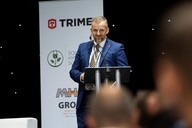
CPA Chief Executive Officer Steve Mulholland
The Conference conversations kicked off with a scene-setting first session entitled ‘The Plant-hire Sector in 2024 - Where the Industry Currently Sits in the Wider Economic and Political Context’, with Chris Cassley, CPA Policy Manager, and Jamie Charles, Lead Economist with Oxford Economics. The consulting and forecasting business has just completed an in-depth report commissioned by CPA into the state and significance of the industry. Called ‘The Economic Impact of the UK Construction Plant-hire Sector’, it was officially published on the day of the Conference and is now available on the CPA website at www.cpa.uk.net
Chris Cassley said the aim had been to evaluate the industry and the role it plays in the wider economy to give invaluable information that would support CPA’s arguments in discussions with government, lobby groups and other stakeholders. The data would also help CPA members make their own representations.
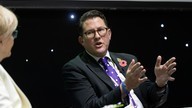
CPA Policy Manager Chris Cassley

Jamie Charles of Oxford Economics (Centre)
Jamie Charles spoke of the exhaustive and painstaking process of amassing the required information from company accounts, survey findings, dialogue with industry associations and interviews with industry experts.
The report’s headline conclusions include that the GVA (gross added value) contribution of the sector to the UK economy is estimated at £14.0 billion and that it is responsible for 191,500 jobs. Interestingly, £218 is added to the economy for every £100 directly generated by the plant hire industry.
Jamie said that the economic benefits were split into three channels: direct impact, which includes the impact of companies themselves; indirect impact which occurs through the supply chain spending of those firms; and the induced benefits which arise from workers in the sector and the supply chain spending their wages.
Under these categories, the industry’s direct contribution to the economy is £6.4 billion, with an additional £3.2 billion indirect contribution and £4.4 billion being induced. Regarding employment, 88,600 people are directly employed, 44,800 indirectly employed and 58,200 jobs are supported indirectly through workers’ spending. Such figures are invaluable in showing plant-hire’s overall significance.
The mature nature of hire in the UK is shown by the statistic that, while GDP contributions by the construction plant-hire sector across EU-27 nations averages 1.8%, the figure for this country is 3.6%. Jamie added that UK firms earned an estimated £10.5 billion in revenue from construction plant-hire activities, supporting a £6.4 billion direct contribution to UK GDP in the form of wages, taxes, rates and so on. This is bigger than many other significant industry sectors, such as printing and electrical equipment manufacture.
Jamie suggested that approximately 90% of CPA members are SMEs (small to medium enterprises). As such, they are likely to be impacted by fiscal measures such as the rise in employer National Insurance contributions. Indeed, Chris Cassley said the CPA had already cited data from the Oxford Economics report in a letter to the Financial Times responding to statements made in an article by prime minister Sir Keir Starmer.

L-R: Brian Jones, Asif Latief, Kathyrn Adams and Mat Llewelyn

In the second conference session, themes under the title ‘The Innovative Plant-hire Company - Insights into Current and Future Developments and Innovations in the Sector’ were discussed by four panellists: Brian Jones, CPA President; Asif Latief, Chief Commercial Officer with Speedy Hire; Kathryn Adams, Commercial Director at Prolectric Services; and Mat Llewellyn, MD of MHM Group.
Recalling Steve Mulholland’s opening remarks, Brian Jones highlighted the need to attract new industry recruits, ideally by making plant-hire appealing to schoolchildren in their early teens. Encouraging them to try out machine simulators could help, as well as promoting the idea that many modern plant machines have cab environments like the game consoles so adored by the young (and not so young).
He also believed that CPA’s Stars of the Future Awards gave further encouragement in promoting plant-hire as a profession for skilled people rather than a trade for workers getting their hands dirty.
Asif Latief said that Speedy is investing in AI to generate efficiencies and savings for customers. Systems can, for example, monitor the equipment hired to a site and check whether it is of the right specification, type and quantity. In this way, fleets can be optimised for the client and hirers might avoid investment in unneeded items.
Asif said that AI could help contractors operating multiple regional sites to tailor equipment to specific locations, as well as predicting what items would be required in future and alerting the project manager in advance.
Prolectric’s Kathryn Adams highlighted the importance of having accurate data about machine performance in terms of sustainability, which would facilitate discussions about various options plus the reductions in carbon and running costs that were achievable. She believed this ability would increasingly differentiate hirers in the ways they serve and retain customers, as users generally seek more sustainable solutions.
The software and telematics on Prolectric machines enables calculations to be made accurately and she cited the example of the A417 road improvement project in Gloucestershire near an Area of Outstanding Natural Beauty. The contractor successfully used Prolectric’s solar street lighting and was then keen to explore other sustainable options. Using captured data, the manufacturer’s ProPower solar hybrid generator was evaluated against traditional diesel machines and was found to be a cost-effective alternative regarding fuel savings, decreased maintenance and cost reductions over the project’s life.
MHM’s Mat Llewellyn said that green equipment was now firmly on the agenda after a slow start – MHM introduced its first hybrid generator back in 2013. He said an important role for diesel equipment would remain for some time yet as fleets were gradually replaced, but it would be increasingly phased out. Echoing an earlier theme, he said collaboration between manufacturer, supplier, hirer and user would be crucial in determining appropriate solutions and their adoption.
He agreed that having good data was vital. MHM has partnered with Gaia Energy whose energy management system (EMS) can monitor power usage, carbon and costs via telemetry. They claim to be able to reduce energy costs significantly, whether a site uses mains electricity or temporary setups, and customers can see the benefits themselves in real time.

CPA Technical and Development Officer Katie Kelleher
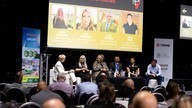
The specific challenge of ‘Expanding the Skills Base’ and of attracting, training and retaining people in the construction industry - and particularly women - was addressed in the third conference session by four panellists: Katie Kelleher, CPA Technical and Development Officer; Deb Madden, Executive Director with CITB; Carl Hassell, Chief Operating Officer of training standards organisation NOCN Group; and Beth Doel, Advanced Technical Trainer at Reaseheath College.
It became clear that there are no easy answers - one reason being that the problems and their causes are hard to identify. Katie Kelleher, who previously became a crane operator in a male-dominated world, said that misogynistic attitudes sadly still prevailed in some circles and that, despite recent initiatives and improvements, more needed to be achieved.
Deb Madden suggested there may be an element of unconscious bias that reinforced a construction site cultural cliché of ‘dads and lads’. However, initiatives like the National Federation of Builders Top 100 Influential Women in Construction could blaze a trail on behalf of not just women, but also those of other genders and sexual identities.
Deb added that in some cases, issues like equity and inclusion are handled with a didactic ‘big stick’ approach rather than seeking genuine cultural change. And while being careful not to generalise, she suggested that many in today’s generation had an approach towards employment of ‘living to work’ rather than ‘working to live’. She said that many young people were completely disillusioned by the dry traditional approach of careers advice officers, so perhaps they would respond more readily to engagement with platforms like TikTok, assuming a trusted influencer could be chosen.
Beth Doel pointed out how widely trainee’s responses differed. Some soaked up learning like a sponge and sought out new challenges to shape a career, while others saw a job as just a temporary stop gap. Care was needed to ensure people could reach their potential.
Katie Kelleher agreed, saying that some schoolchildren were enthralled when she told them how as a crane operator she would often started work at 5am and put in long shifts in a job she enjoyed; others, however, were totally indifferent. She further wondered if employment practices should adapt further to meet modern demographics and be more flexible. “People’s lives change,” she said, “and after ten years of being with someone you might find you have to start caring for them. What can employers do to accommodate this?”
Like earlier speakers, Carl Hassell said the industry had to make itself more appealing. It also had to ensure that any training provided was genuinely fit for purpose and comprehensive: if some employers just took the cheapest possible route, a trainee might not be fully equipped for the real world of work. A more holistic approach was required, focused on future needs and personal development. This could help employee retention.
The panel for this session did agree, however, on some positives. Carl Hassell pointed out that funding is available for training through CITB and other agencies. Deb Madden highlighted the breadth of good resources available completely free from the Supply Chain Sustainability School, and not just on construction topics but also themes like equity, diversity, inclusion and neurodiversity. And Katie Kelleher said CPA was ready to offer members advice on recruitment and employee retention.

David Graham and Chris Harvey

Dani Saveker

Beth Doel
While most challenges facing business are firmly in the present, a corporate eye must be kept on the future, which was the focus of the fourth conference session entitled ‘What Next? The Challenge of Growth and Succession Planning’. Participants included David Graham and Chris Harvey, two Co-Founders and Directors of The Hire Exchange, set up to connect buyers and sellers of hire companies, which can be difficult to value accurately; Dani Saveker, Global CEO and Founder of the GLAS Group consultancy which supports entrepreneurs; and Ian McMillan, Head of Business Development at the Thomas Group which has grown by acquisition beyond its original plant-hire activity to serve other related markets.
David Graham pointed out that someone with great entrepreneurial flair who worked hard to create a successful hire company might not necessarily have the skills to value the business objectively or prepare it for a transfer of ownership. Any potential buyer would seek rock solid financial data for a proper evaluation to minimise their risk.
In his experience, many owners would find it difficult to determine exactly where the strengths really lay that would appeal to a new owner: hidden gems might lie in an unsuspected area of the business. An outside consultant with expertise, he said, could smooth negotiations between a keen seller and a willing buyer.
Chris Harvey said most businesses do not consider their exit strategy until very late on. And many firms have been run with an emphasis on areas like minimising taxation, which might not ultimately put them on an ideal footing for sale. Having the right data about the business to present to a possible buyer was key; they would be interested in future growth potential rather than past performance.
Ian McMillan highlighted the importance of keeping personnel informed as far as practically possible during a sales process. If people were told suddenly about a transfer of ownership on the day it happened, they would be understandably apprehensive; a better approach might be to float the idea in advance that a future sale was being explored but with minimum disruption. This could help preserve staff confidence and loyalty.
Dani Saveker, who as a fourth generation CEO of a family business had to effect a management buyout and make several relatives redundant to preserve the company, said that while some 90% of the world’s businesses are family owned, many find succession planning hard. Yet the need for such conversations having taken place would be vital if a time came when a company found itself not moving forward.

Steve Kerslake

Gary Higgerson
The final session considered ‘Mental Health and Wellbeing in the Construction Sector’ with participants comprising Steve Kerslake, Trustee and Founder of Construction Sport which enables industry workers to participate in rugby tournaments, walks and other group activities promoting camaraderie and wellbeing; Gary Higgerson, a Charity Advocate with the Lighthouse construction charity; and Matt Hartill, Head of Wellbeing and Mental Health Support at Lyndon SGB, who told Conference delegates movingly about overcoming his own serious mental health challenges.
Matt, an ex-army professional and an advanced scaffolder by trade, had suddenly found himself in a severely depressed state after a series of close family bereavements, during which he felt he had no-one to share his feelings with objectively. Furthermore, being a male and traditionally expected to ‘man up’ compounded the issue.

Matt Hartill
In an emotional address to the audience, Matt described how he had ultimately started to plan taking his own life. However, a work colleague thankfully noticed that he was not his normal self. They contacted another team member who was trained in suicide first aid; they rang Matt and invited him to go for a coffee. When face to face, he asked Matt if he was feeling suicidal and it was a breakthrough moment: Matt knew he could ask for help.
Matt said his experience showed the immense value of training people as mental health first aiders and also suicide first aiders, because they know what to look for and how to elicit meaningful responses so they can coordinate help.
Steve Kerslake said that group activities like those provided by Construction Sport helped promote togetherness and overcame the sense of isolation that was a common precursor to mental stress and suicidal feelings.
Gary Higgerson pointed out the importance of asking the right questions, in the right way. He poignantly observed that many people tell lies every day by responding “I’m fine” when asked how they are, yet in reality they might be in a troubled space. One approach was to follow up the question “How are you?” with “But how are you, really?”.
And this demonstrates the immeasurable value of people working together, looking out for one another as we move forward. It also showed the ongoing importance of human interaction and intervention in a perhaps more AI-driven world.
Indeed, earlier in the Conference and in a more light-hearted vein, CPA President Brian Jones recounted an incident when visiting Paris last April to attend the Intermat exhibition as a member of the Innovation Award judging panel.
Brian ordered a beer in his hotel bar and was taken aback when it was brought to him by a robot waiter, which then asked him in a digital voice if the beverage was to his satisfaction; when Brian said it wasn’t really cold enough, the robot promptly malfunctioned and he was left with the warm drink.
So, while plant-hire’s future might be increasingly digitised and computerised, the CPA Conference showed that the human touch will remain vital for the foreseeable future and beyond.
Alan Guthrie is a journalist and founder of the industry blog Alan Guthrie On Hire
Future Options
There was a record number of sponsoring exhibitors at the CPA Conference promoting products and services to help plant-hirers meet new challenges.
Headline Conference Sponsor MHM Group provides energy solutions that reduce costs and environmental impact, specialising in the rental and sale of used generators, solar hybrid systems and energy management tools. Having partnered with Gaia Energy, a designer of remote and off-grid power supply systems, MHM offers turnkey solutions enabling carbon reductions and costs to be monitored and managed seamlessly. Cost reductions of up to 80% can be made on transient and permanent sites, whether using mains power or temporary setups. The company’s energy management system (EMS) software allows clients to track performance and make data-driven judgements to further improve efficiency and savings.
ACOP Group are award-winning providers of CPCS plant training, testing and NVQ assessment on all categories of machinery. The company combines classroom teaching with hands-on training on equipment like excavators, dozers, forklifts, telescopic handlers, compacting plant, dumpers, cranes and access platforms, amongst others. Courses can be tailored to any ability and level of experience.
Acrow Bridge serves the construction and transportation industries with a wide range of modular temporary steel bridging solutions for permanent, temporary and emergency use. Customisable in length, width and strength, structures are designed for ease of assembly, erection and disassembly. Available to buy or hire, bridges are supplied from UK stock for immediate delivery.
CESAR security systems deter plant theft and aid the recovery of stolen equipment. The new Rapid search application enables police officers to access the CESAR database of over 650,000 registered assets directly from their smartphones for quick identification. It also draws on information from the Police National Computer (PNC) and an insurers database.
CITB have introduced Employer Networks. This involves CITB booking the training on behalf of the employer (with their preferred provider if they have one) and CITB paying the provider a CITB subsidy (currently 70% of the course cost). The provider then invoices the employer for the balance. To access this service contact your local CITB advisor.
Capja’s paperless systems enable plant-hire firms to manage data efficiently. CapjaDocs allows documents to be retrieved by scanning a QR code, and AI integration is being developed to offer on-screen fillable forms. With new FlexiQR codes, users can pre-print or download a batch of unassigned codes for efficiency, flexibility and environmental friendliness.
Conquip’s services to the construction industry include engineering services, innovative products and solutions, equipment sales and rental, plus after-sales support from five regional depots across the UK. Next day delivery is available on much of the company’s range. Sectors served include infrastructure, housebuilders, groundworks and civils, RC frame/built environment and construction companies.
Explore Plant & Transport Solutions supplies transport and plant-hire services to diverse industries including construction, rail and aerospace. Since being founded in 2015, the company has grown to encompass 150 trucks, 6,000 plant hire assets and 7 depots nationwide, creating 300 jobs and generating annual revenue in excess of £70 million.
GGR Group’s lifting products and services encompass vacuum lifting equipment and glazing robots, restricted access lifting solutions, mini crawler cranes, spider cranes pick and carry cranes and even crane operator hire. The massive new electric GF420 crane has a lifting capacity of 42 tonnes and its 1395Ah battery provides hours of continuous operation.
Welfare accommodation specialist Groundhog promoted static and mobile units designed for maximum sustainability. Flagship iRange hybrid models offer a near-total reduction in carbon emissions, typically running off solar power for ten months of the year, with the onboard battery charger only running at other times. This minimises fuel use, servicing and costs.
The new NOCN Group Online CPD Course replaces the CPCS card Renewal Test for a more efficient and effective means of demonstrating the competence and skills needed to renew CPCS cards. e-learning is accessed easily on any device connected to the internet, including smartphones, and can be completed at any convenient time and location
Parksafe Group offers a range of safety cameras and machine monitoring systems which can be fitted to excavators, dumpers, forklifts, waste collectors and other plant, including pedestrian detection, driver monitoring and 360 birds-eye view cameras. A web portal lets fleet managers access information 24 hours a day and track machine locations.
Plant Parts offers original and non-original parts for machines including final drives, swing drives, slew rings recoil springs and hydraulic pumps plus fitting kits. The company monitors the market to suggest the best solution and is a ZF Aftermarket partner supplying final drive gearboxes, swing gearboxes, front and rear axles, transmissions and mixer gearboxes.
Plant Planet is a one-stop shop for news and information about the world of plant across multiple platforms including print, online, digital and app formats. It covers the latest news, releases and insights from the construction industry to provide readers with impartial information from across the world of heavy machinery.
Plantworx is the UK’s biggest construction equipment event showcasing the latest innovations in the industry. The 2025 exhibition takes place on 23-25 September and has a new location at Newark Showground. The show attracts 400+ exhibitors including leading brands, new technology and live demonstrations, and a new feature is the Shared Digging Zone.
Hire software specialist Point of Rental Software recently announced a new integration between its Syrinx system and the AccountsIQ cloud-based accounting software. This is designed for hire companies that are outgrowing entry-level systems and offers advanced financial capabilities without the complexity or cost of a full ERP (enterprise resource planning) program.
Prolectric’s award-winning off-grid solar lighting towers and hybrid power generators are enabling businesses to transform the ways in which they operate, cutting carbon emissions, reducing fuel consumption and minimising operational costs. Designed as a value-for-money alternative to traditional diesel systems, Prolectric’s products are helping users transition smoothly to sustainable energy.
Record360, a Point of Rental Software brand, is an app enabling hire personnel to take pictures and videos of machinery using a smartphone during a walk-round inspection to record damage. It is designed for ease of use and to date more than 8 million assets have been inspected and 400 million images captured.
Rouse Services offers a data platform enabling hire companies to compare their own rental rates and utilisation levels with their peers, integrating with commonly used software systems. Also available is SmartEquip, a multi-manufacturer platform for parts and spares information that enables orders to be placed across many brands on a single platform.
Scottish Qualifications Authority (SQA) offers training internationally in many plant disciplines, including Ofqual and Qualifications Wales recognised programmes in: operative and specialisms; technical, supervisory and management; confined spaces; and street works. The organisation can also devise customised solutions. It offers Awards, Certificates and Diplomas in construction skills, including knowledge-based and workplace assessed qualifications.
www.sqa.org.uk/buildingfutures
Spartan Digital Operations has developed the Phalanx 6 suite of mobile apps and tools to digitise logistics and services needs, designed specifically for rental applications. It integrates with major hire management software and can process operational aspects at the depot or in the field. It can also incorporate telematics and artificial intelligence data.
The Supply Chain Sustainability School is a free virtual learning platform upskilling those working within the built environment sector covering three core Sustainability pillars: Environmental, Social and Economic. It looks at issues ranging from carbon management to combatting modern slavery, plus topics like Digital, Fairness, Inclusion & Respect, Management, Offsite, People, Procurement and Retrofit.
Thomas Group offers self-drive and operated plant on a national basis. The company can also provide machine control systems from suppliers such as Leica, Topcon and Trimble, as well as its own On Grade GPS machine control equipment hire, installation and monitoring service. Systems are available in 2D, 3D or total station formats.
www.thomasplanthire.co.uk/the-thomas-group
Tranzaura is a customisable fleet intelligence and management system powered by AI and using Microsoft Azure cloud-based tools. It gives real-time insights for fleet managers, workshops and drivers across multiple depots and locations. The system enhances communications between drivers and engineers, enabling better resource planning. Users include Travis Perkins, Yorkshire Water and DPD.
VUE Group’s Human Detection System uses cameras powered by AI to detect human forms round plant. The algorithm employed is exclusive to VUE and continuously refines itself via machine learning. The system informs operators and pedestrians by audio and visual alerts to reduce accident risks, and alerts are reported and recorded in real time.
WOLFF Onsite provides tower crane accessories and general construction equipment. The new compact Hybrid Power Unit combines a battery pack with a diesel generator for efficient running and fuel reductions up to 90%. It has an output of up to 160kVA and an automatic boost delivers 150% of that power for a maximum 15 seconds.
